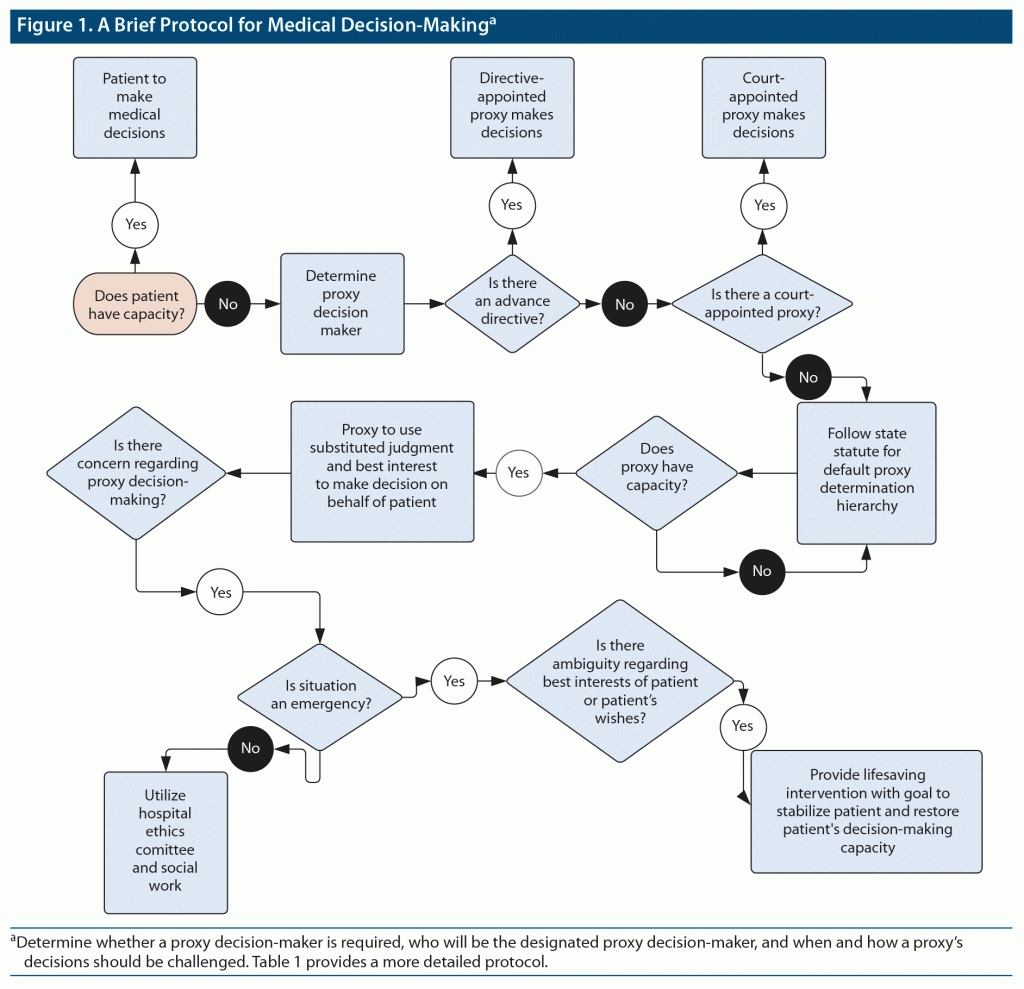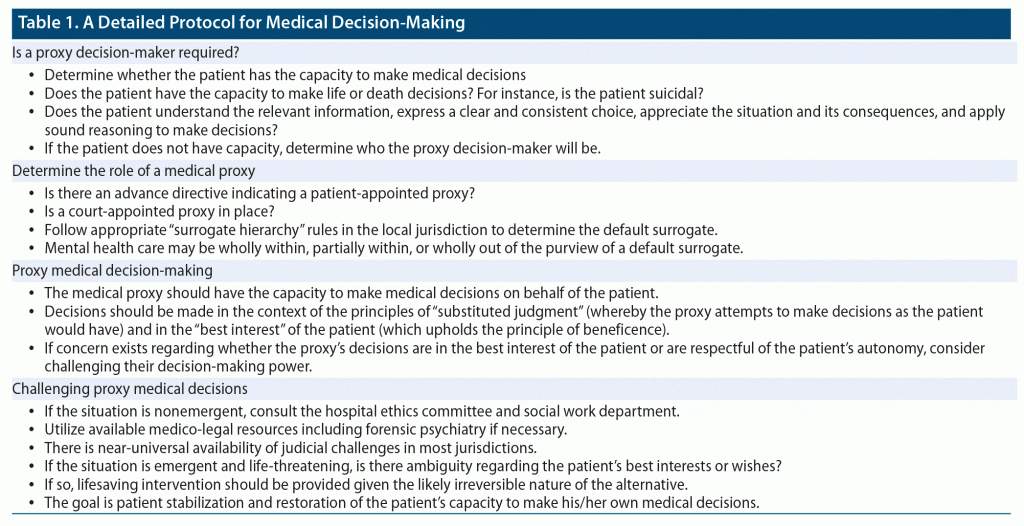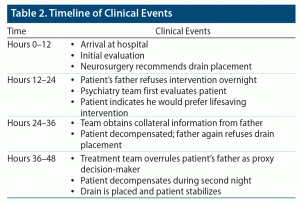
LESSONS LEARNED AT THE INTERFACE OF MEDICINE AND PSYCHIATRY
The Psychiatric Consultation Service at Massachusetts General Hospital sees medical and surgical inpatients with comorbid psychiatric symptoms and conditions. During their twice-weekly rounds, Dr Stern and other members of the Consultation Service discuss diagnosis and management of hospitalized patients with complex medical or surgical problems who also demonstrate psychiatric symptoms or conditions. These discussions have given rise to rounds reports that will prove useful for clinicians practicing at the interface of medicine and psychiatry.
Prim Care Companion CNS Disord 2022;24(3):21f03102
To cite: Varghese R, Patel K, Burke H, et al. Challenging a surrogate decision-maker: a case of an incapacitated patient following self-enucleation. Prim Care Companion CNS Disord. 2022;24(3):21f03102.
To share: https://doi.org/10.4088/PCC.21f03102
© Copyright 2022 Physicians Postgraduate Press, Inc.
aDepartment of Psychiatry and Behavioral Neurosciences, Tampa General Hospital, University of South Florida, Tampa, Florida
bDepartment of Psychiatry, Massachusetts General Hospital, Harvard Medical School, Boston, Massachusetts
*Corresponding author: Rojan Varghese, MD, Department of Psychiatry and Behavioral Neurosciences, USF Health, 3515 E Fletcher Ave, Tampa, FL 33613 ([email protected]).
Have you ever wondered when and why you can challenge a surrogate decision-maker’s decisions regarding the care of an incapacitated patient? Have you been uncertain about how to contest or negate their decisions? If you have, the following case vignette and discussion should prove useful.
CASE VIGNETTE
Mr A, a 53-year-old man with schizoaffective disorder and an unremarkable medical history, arrived at our hospital via helicopter from an outside hospital after being found (by his father) unresponsive at his home with a ruptured right orbital globe after self-enucleation. An emergency computed tomography angiography neuroimaging study revealed that Mr A had developed an acute right internal artery occlusion, a right carotid artery dissection, an acute diffuse subarachnoid hemorrhage in the bilateral fronto-temporal-parietal and basilar cisterns, an acute diffuse intraventricular hemorrhage with early obstructive hydrocephalus, and a ruptured orbital globe that necessitated transfer to our hospital for neurosurgical evaluation.
In our emergency department, Mr A’s Glasgow Coma Scale1 (GCS) was 6T, with extensor posturing on the right side and left-sided flaccidity. The neurosurgery team recommended immediate placement of an extraventricular drain (EVD) and possibly a cerebral angiogram; without these interventions his prognosis would be grim. Given Mr A’s inability to participate in medical decision-making and the lack of a known court- or patient-appointed medical decision-maker, Mr A’s father was deemed his health care surrogate. Mr A’s father fervently believed that his son had made this suicide attempt due to chronic suffering from his long battle with schizoaffective disorder. Thus, he declined to give consent for the proposed neurosurgical interventions, despite understanding that the procedures would be lifesaving. Remarkably, Mr A survived that first night; his GCS score improved (to a score of 10), he opened his left eye to verbal prompting, and he moved his extremities.
The psychiatric consultation service first saw Mr A approximately 16 hours into his admission. Although Mr A was intubated, he was alert, oriented to his name and situation, and calm and cooperative. His thinking was somewhat slowed, but he screened negative for delirium on the Confusion Assessment Method for the Intensive Care Unit (CAM-ICU).2 He confirmed that he had pulled out his right eye.
Mr A reported that he had been experiencing command auditory hallucinations and the belief that Satan was residing within his right eye. As such, he was “ordered by God to remove [his] eye to continue the war against Satan.” He expressed a strong desire to receive neurosurgical or other medical intervention that would enable him to recover. He adamantly denied being suicidal, had not attempted suicide in at least 5 years, and stated that all prior attempts had come in the setting of command hallucinations. He also denied having a history of substance use. He reported prior self-mutilatory behaviors and indicated that his thought disorder was not being treated.
DISCUSSION
When Should a Surrogate Decision-Maker Make Decisions for an Incapacitated Patient?
When a patient cannot make medical decisions for himself or herself, a surrogate decision-maker or medical proxy should be assigned to make decisions on the patient’s behalf. Until relatively recently, physicians largely determined the appropriate treatment for their patients using the principle of the best interests of a patient, rather than relying upon the choices expressed by patients. Over the past century, this concept, known as paternalism, has given way to greater patient autonomy. In 1976, a landmark case, In re Quinlan, determined for the first time that a medically incapacitated patient could refuse life support by way of a decision made by family members.3 Later, in 1985, Idaho became the first state to pass a surrogate decision-making statute. In 1990, the Patient Self-Determination Act was passed, which mandated that patients should be asked, upon admission to a hospital, whether they have an advance directive. If they do not, they must be given information on creating one.3 At present, all 50 states have surrogate decision-making statutes. However, these laws are inconsistent with regard to who can be a surrogate, how the hierarchy of decision-makers should be established, or how disputes regarding decisions are to be resolved.4 A proxy decision-maker is usually expected to follow the principle of substituted judgment (which involves determining and adhering to the patient’s wishes with regard to the appropriate level and nature of medical care they desired). When clinicians doubt that the decisions being made by a proxy are appropriate, there is little legal guidance available to aid clinicians. Judicial challenges exist in all 50 states; however, they are often of limited utility in cases of emergencies in which delay in care can lead to death. Only 5 states have statutes that address extrajudicial procedures for challenging the decisions of surrogate decision-makers.4
What Types of Conditions Can Impair an Individual’s Capacity to Make Decisions on Their Own Behalf?
In general, there has been an ethical consensus on the treatment plan when a patient is in the throes of acute psychosis, mania, cognitive impairment, or even profound depression, and they are medically incapacitated and unable to make medical decisions regarding their care.5,6 Almost all documented cases present in the context of either organic etiologies or substance-induced psychosis or mania, and, notably, there have been no documented episodes associated with suicidal intent or attempts.
Our patient removed his eye (self-enucleation, which is a severe though rare form of self-mutilation with an estimated 500 cases a year annually7) in response to psychosis. However, his surrogate decision-maker made decisions about care that were diametrically opposed to Mr A’s stated wishes.
What Are the Legal Underpinnings of Substituted Judgment and Decision-Making Proxies?
Statutes that regulate the determinants for decision-for-proxy judgments explicitly state that the surrogate should attempt to make medical decisions in accordance with the patient’s wishes or what is otherwise known as the “substituted judgment” standard for decision-making.8,9 However, medical proxies are not selected because of their skill in applying this often nonintuitive and cognitively complex judgment standard. A review by Shalowitz et al10 found that proxies were only accurate two-thirds of the time when predicting patient preferences. Other studies have found similar results, with patient-proxy agreements ranging from 58% to 81%.10–12 Therefore, when acute incapacitation arises, the goal should not be to treat or cure the patient’s medical condition in and of itself, though this provides a significant ancillary benefit, but rather to attempt to restore the patient’s capacity to make his or her own medical decisions and to regain his or her autonomy.
The potential pitfalls of proxy decision-making are more apparent when considering the complexity of medical ethics in the context of severe mental illness. State statutes for default surrogacy often have separate guidelines for mental health treatment. Eight states do not limit mental health decision-making by default surrogates, while 4 states have blanket prohibitions against medical decision-making by default surrogates, and 25 states have specific exceptions for mental health decision-making by default surrogates (most commonly for electroconvulsive therapy, psychosurgery, admission to a mental health facility, or psychotropic administration).5
State statutes notwithstanding, psychopathology often has an extraordinary impact on the determination of capacity. Cases of self-enucleation are rare, and almost all cases of it present in the setting of substance-induced psychotic or manic episodes. Notably, there have been no documented episodes associated with suicidal intent.13,14 Mr A confirmed that he had not made a suicide attempt and had not been suicidal; these statements were in stark contrast with the beliefs expressed by his father. However, even if Mr A had been suicidal, patients who are acutely suicidal cannot refuse lifesaving intervention, under the premise that they do not have the capacity to make that decision.4
In the setting of acute psychopathology, a patient’s wishes regarding lifesaving treatment should be assessed from the point at which their psychiatric illness was well-controlled. Brown et al15 suggested using a protocol that involves a 72-hour waiting period, wherein lifesaving interventions would be continued after a suicide attempt, allowing the treatment team and other stakeholders time to reconsider interventions before deciding whether to withdraw care. With treatment, a patient can regain the capacity to make decisions regarding end-of-life care.
In Mr A’s case, the lifesaving neurosurgical intervention had clear benefits, most notably prevention of death. However, the medical proxy has been given the authority and responsibility to uphold the patient’s autonomy. Even if his father had been acting in Mr A’s best interests as he understood them, lifesaving intervention should not be delayed in a situation in which a patient’s wishes are ambiguous.
What Can Be Done When There Are Significant Concerns About the Appropriateness of the Decisions Being Made on Behalf of a Patient By Their Proxy?
Initially, it is important to determine the patient’s capacity to make medical decisions, so that patient autonomy can be served. Evaluation includes questions such as, “Does the patient understand the information, express their choice, appreciate the situation, and apply sound reason to make decisions?”16 If the patient is deemed to lack capacity, who can be appointed as their medical proxy? Is there a patient-appointed proxy via an advance directive or a court-appointed proxy?” In the absence of either, state statutes that appoint a default surrogate should be followed. The proxy must then have the capacity to make decisions on behalf of the patient. Most statutes indicate that the proxy should make their decisions based on the principle of “substituted judgment” and be mindful of maintaining the patient’s best interests. If there is concern surrounding a proxy’s medical decision-making, concerns should be communicated to the proxy. In nonemergent settings, hospital policies typically recommend utilization of the hospital’s ethics committee and social work staff and consider the possibility of a judicial challenge. Given the medico-legal nature of the dilemma, it can be appropriate to involve a forensic psychiatrist when available. However, in an emergency, beneficence should be prioritized when the patient’s wishes are ambiguous. The ideal outcome is that of a return to decision-making capacity by the patient. Our protocol is provided in Figure 1, and a more detailed protocol is described in Table 1.
Advanced directives are better associated with patients receiving care according to their preferences as compared with default surrogacy; however, there are few data regarding head-to-head comparisons of health care outcomes between the two.17 There also remains the issue of the ethics of determining the capacity of a surrogate decision-maker, given that he or she is not the patient in question. Yet, consider the general acceptance of obtaining collateral information when needed to guide a patient’s treatment. Physicians are frequently called upon to critically evaluate information provided from outside sources albeit informally. Capacity is assessed at a singular moment in time regarding a specific question; the assessment being made in this case is not that of the surrogate’s capacity to make decisions. Instead, we seek to determine our patient’s own capacity, though circumstances necessitate this assessment be made by proxy, in the effort to maintain our patient’s autonomy.
What Happened to Mr A?
It became apparent that Mr A’s psychotic disorder decompensated due to medication nonadherence. However, since Mr A’s cognitive status improved overnight, we recommended that medical decision-making be rediscussed with him.
Mr A’s father reported that his son was first diagnosed with schizophrenia and bipolar disorder at the age of 25 years and that he had at least 6 hospitalizations since then and had been tried on numerous antipsychotics. Mr A was last hospitalized at age 50, at which point he was started on monthly long-acting injectable haloperidol and had been stable. However, Mr A missed several recent doses, his behavior became more erratic, and he began to hallucinate.
Mr A’s father believed that his son’s self-enucleation represented the desire to end his suffering and his life and said, “After 27 years, let him do what he needs to do; it’s time to stop.” Mr A’s father dismissed the report about his son wanting to live and again insisted that his son would prefer to pass away. He repeatedly expressed a diminished desire to care for his son and described the burden such care was placing on his own life.
Despite repeated conversations with Mr A’s father, his position failed to change. The team decided to challenge his proxy decisions, as it became apparent that Mr A’s father did not appreciate the information presented to him (or its consequences) or act in a way that his son would have wanted. Therefore, the team consulted the hospital’s ethics committee for formal guidance on decision-making, with the understanding that in an emergency the team would act in Mr A’s best interests and in accordance with his wishes.
Although Mr A continued to improve (GCS score = 13) and was extubated, his cognition declined, and he became autonomically deranged during his second night in the hospital, necessitating reintubation. Once again, the question of EVD placement was broached, and the decision was made to proceed with the drain placement. The drain was then placed successfully without complications. Mr A continued to improve during his hospital admission, and he returned to his baseline level. Despite use of antipsychotics, he remained hyper-religious; however, he no longer endorsed auditory hallucinations, and his psychosis and function improved. Table 2 provides Mr A’s course of treatment.
CONCLUSION
Occasionally, physicians are placed in the position to challenge whether a patient’s proxy appears to make decisions that do not align with the wishes of, or the best interests of, the patient. Time is a critical consideration in such cases, notably the relevant portions of this case occurred in less than 48 hours. Our ethical obligation is to abide by the patient’s wishes, while also providing the best possible care. To achieve this, it is important to discuss the roles of the various team members. The primary treatment team (attending physicians and trainees) is ultimately responsible for clinical treatment decisions. Consultants are asked to provide recommendations informed by their specialization that they offer to the primary team. The hospital lawyer and ethics committee are essential in their ability to advise clinicians in matters of medical law. Following a systematized protocol should help clinicians identify ethical issues and practical strategies so that they can determine the appropriate intervention. When a proxy medical decision-maker is not acting as the patient wished or in the best interests of the patient, the decision-making of the surrogate can be challenged. We have presented a protocol to aid clinicians when assessing the need for a proxy, when determining the identity of the proxy, and when questioning the correctness of a proxy’s decisions, so that a proxy’s decisions can be challenged.
Submitted: August 13, 2021; accepted October 5, 2021.
Published online: May 12, 2022.
Relevant financial relationships: Dr Stern is the editor-in-chief emeritus of the Journal of the Academy of Consultation-Liaison Psychiatry. Drs Varghese, Patel, Burke, Cohen-Oram, and Jiang have no disclosures or conflicts of interest to report.
Funding/support: None.
Clinical Points
- Physicians will occasionally encounter situations in which a patient’s proxy will make decisions that do not align with the wishes or best interests of the patient.
- The ethical obligation of a physician is to abide by the patient’s wishes, while providing the best possible care.
- The availability of a systematized protocol for challenging proxy decision-making will help provide more consistent and ethical care in these situations.
References (17)

- Jain S, Iverson LM. Glasgow Coma Scale. In: StatPearls [Internet]. Treasure Island, Florida: StatPearls Publishing; 2022 Jan-. Accessed April 13, 2022. https://www.ncbi.nlm.nih.gov/books/NBK513298/
- Miranda F, Arevalo‐Rodriguez I, Díaz G, et al. Confusion Assessment Method for the Intensive Care Unit (CAM‐ICU) for the diagnosis of delirium in adults in critical care settings. Cochrane Database Syst Rev. 2018;(9):CD013126. CrossRef
- Comer AR, Gaffney M, Stone C, et al. What do you mean I cannot consent for my grandmother’s medical procedure?”: key issues with state default surrogate decision making laws. Indiana Health Law Rev. 2017;14(2):1. CrossRef
- DeMartino ES, Dudzinski DM, Doyle CK, et al. Who decides when a patient can’t? statutes on alternate decision makers. N Engl J Med. 2017;376(15):1478–1482. PubMed CrossRef
- Neavyn MJ. Suicide and the surrogate. J Med Toxicol. 2014;10(1):3–6. PubMed CrossRef
- Doyle CK, DeMartino ES, Sperry BP, et al. Statutes governing default surrogate decision making for mental health treatment. Psychiatr Serv. 2021;72(1):81–84. PubMed CrossRef
- Clinebell K, Valpey R, Walker T, et al. Self-enucleation and severe ocular injury in the psychiatric setting. Psychosomatics. 2016;57(1):25–30. PubMed CrossRef
- Nicoli F, Cummins P, Raho JA, et al. “If an acute event occurs, what should we do?” diverse ethical approaches to decision-making in the ICU. Med Health Care Philos. 2019;22(3):475–486. PubMed CrossRef
- Tejwani V, Wu Y, Serrano S, et al. Issues surrounding end-of-life decision-making. Patient Prefer Adherence. 2013;7:771–775. PubMed
- Shalowitz DI, Garrett-Mayer E, Wendler D. The accuracy of surrogate decision makers: a systematic review. Arch Intern Med. 2006;166(5):493–497. PubMed CrossRef
- Spalding R. Accuracy in surrogate end-of-life medical decision-making: a critical review. Appl Psychol Health Well-Being. 2021;13(1):3–33. PubMed CrossRef
- Sulmasy DP, Haller K, Terry PB. More talk, less paper: predicting the accuracy of substituted judgments. Am J Med. 1994;96(5):432–438. PubMed CrossRef
- Lee MH, Atik A, Jao K, et al. Autoenucleation in the context of psychosis. Aust N Z J Psychiatry. 2015;49(9):847–848. PubMed CrossRef
- Castro HM, Alvarez J, Bota RG, et al. A case of attempted bilateral self-enucleation in a patient with bipolar disorder. Ment Illn. 2017;9(1):20–22. PubMed CrossRef
- Brown SM, Elliott CG, Paine R. Withdrawal of nonfutile life support after attempted suicide. Am J Bioeth. 2013;13(3):3–12. PubMed CrossRef
- Appelbaum PS. Clinical practice. assessment of patients’ competence to consent to treatment. N Engl J Med. 2007;357(18):1834–1840. PubMed CrossRef
- Silveira MJ, Kim SYH, Langa KM. Advance directives and outcomes of surrogate decision making before death. N Engl J Med. 2010;362(13):1211–1218. PubMed CrossRef
Enjoy this premium PDF as part of your membership benefits!








